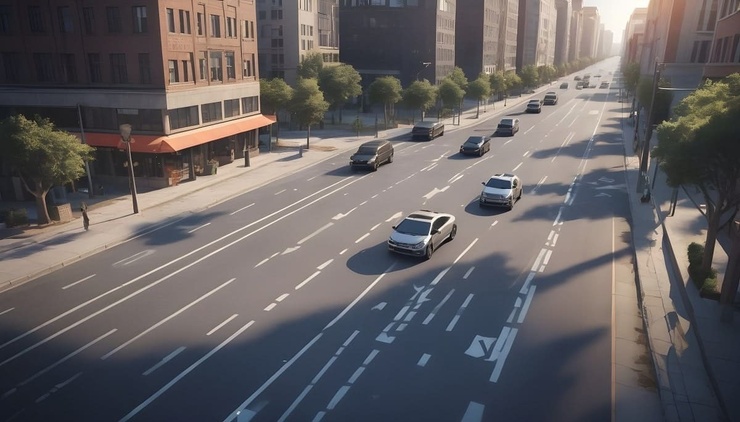- Last-Mile
From Manual to ML-powered: The Evolution of Routing Solutions in the Last Mile
Table of Contents
- The Evolution of Last Mile Routing Solutions
- What Sets Modern Last Mile Routing Solutions Apart?
- Case Study: How a Leading Food Service Made Same-day Delivery a Competitive Advantage
- The Road Ahead: The Future of Last Mile Routing
- Ready to Upgrade Your Last Mile Routing Strategy? Talk to FarEye
- FAQs

Recent forecasts project the global autonomous last mile delivery market to reach USD 44.56 billion by 2034, growing at a CAGR of 23.71%. This fast expansion highlights how technology is redefining the final link in distribution chains, where tighter delivery promises and stricter regulations converge.
In such conditions, accurate last mile routing becomes essential for balancing cost, service, and sustainability on a unified platform. Equally crucial are flexible last mile routing solutions that draw on live inputs such as traffic flows, weather changes, and vehicle diagnostics to refresh ETAs and re-sequence stops in real-time.
Let us explore how these capabilities have evolved from manual planning to machine learning intelligence and where they are headed next.
The Evolution of Last Mile Routing Solutions
Understanding how routing has matured, from manual intuition to AI-driven automation, provides essential context for today's performance benchmarks. Each stage of progress introduced new data sources, optimization techniques, and stakeholder expectations, shaping the requirements that current platforms must meet. By tracing this path, decision-makers can see why late adoption of advanced tools widens cost and service gaps.
- Challenges and Limitations of the Manual Era
In the manual era, dispatchers used paper manifests and personal knowledge to form daily plans. Traffic data were static, address errors were frequent, and every on-the-fly change lengthened driver shifts.
These shortcomings produced low truck utilization and rising overtime, illustrating how fragile manual last mile routing was and why paper-based last mile routing solutions could not scale.
- The First Digital Leap in Route Planning
Desktop mapping tools introduced zone batching and turn-by-turn directions that trimmed miles, yet they still produced static plans. Congestion, weather, or late orders invalidated routes by mid-morning, forcing drivers to improvise.
These limitations proved that responsive last mile routing solutions, capable of updating plans in real-time, would be essential for modern delivery promises.
- The Rise of AI and ML in Last Mile Routing
Machine learning unlocked real-time dynamic route optimization that adjusts routes every few minutes. A proprietary AI-powered routing algorithm learns from dwell times, weather, and driver behavior.
Consequently, modern last mile routing solutions can continuously update ETAs, re-sequence stops, and reduce empty miles. With this leap, adaptive intelligence replaced traditional rules as the hallmark of superior last mile routing.
What Sets Modern Last Mile Routing Solutions Apart?
Today's routing platforms must satisfy a far broader brief than their predecessors. They orchestrate data from telematics, order systems, and customer apps while enforcing compliance, sustainability, and cost targets, all within a single workflow.
The following section explains how cutting-edge capabilities, delivered through FarEye's All-in-One Platform, set new standards for efficiency and transparency in last mile routing solutions.
- Real-time Dynamic Route Optimization
FarEye ingests traffic feeds, order edits, and geofence alerts to refresh schedules within seconds. A Plug & Play Routing API lets shippers feed orders from any OMS or TMS and receive optimized paths that respect vehicle type, toll costs, and driver rules.
This capability keeps last mile routing accurate across dense urban grids while ensuring compliance with transportation regulations. - Smart Task Allocation and Driver Productivity
The platform balances capacity, costs, and shift limits through fully customized routing solutions. Using hyperlocal route planning, it broadcasts new orders to nearby drivers, improving fleet utilization, trimming driver miles, and maintaining equitable pay. Territory Planning analyses quarterly histories to define optimal service areas, aligning workload, and minimizing travel distance.
Together, these functions lift stops per hour and standardize service across regions, proving how modern last mile routing solutions boost productivity and regulatory compliance. - Customer-centric Features: Time Windows and Transparency
Checkout widgets surface only feasible slots, while predictive ETAs push live status updates by SMS and branded portals. These customer-centric tools reduce "Where is My Order?" (WISMO) calls and demonstrate the value of transparent last mile routing solutions that integrate seamlessly with order platforms. - Sustainability and Green Routing
Built-in CO₂ dashboards calculate grams per stop and direct buyers toward windows that prioritize EV and green fleet assets. By factoring battery range, charger locations, and load weight, ML-based last mile routing aligns delivery promises with corporate ESG goals, turning environmental compliance into a competitive differentiator.
Case Study: How a Leading Food Service Made Same-day Delivery a Competitive Advantage
Real-world results illustrate the tangible benefits of modern routing technology. This case outlines how a national food-service distributor used FarEye to overcome manual planning constraints, meet same-day delivery expectations, and strengthen customer relationships through data-driven last mile routing solutions.
- The Challenge: Manual Routing and Rising Customer Expectations
A leading food-service distributor traditionally shipped weekly truckloads from regional distribution centers. To avoid customer stock-outs, it aimed to fill same-day orders from local stores functioning as mini-fulfilment hubs.
Manual last mile routing required hours of replanning, often missed tight three-hour windows, and provided no real-time status to clients, clear evidence that legacy last mile routing solutions could not support the new service level.
- The Solution: FarEye's ML-powered Optimization and Real-time Visibility
FarEye introduced an end-to-end system that unites capacity planning with order management. Its proprietary AI-powered routing algorithm produced optimized van routes in minutes and refreshed ETAs through ongoing real-time dynamic route optimization.
Hyperlocal broadcasting matched incoming orders to nearby drivers, while mobile apps delivered turn-by-turn navigation, proof-of-delivery, and instant status updates. Customers could now choose convenient three-hour windows and track progress in real-time, all powered by adaptive last mile routing solutions.
- Business Impact: Sales Growth, On-time Delivery, and Operational Transparency
The new approach generated significant sales growth, as same-day orders captured demand that previously required in-person store visits. On-time performance exceeded 95%, and optimized last mile routing reduced empty miles and overtime costs.
Managers gained live capacity dashboards, while customers saw accurate track-and-trace updates. The results confirm that ML-driven last mile routing solutions transform speed and transparency into lasting competitive advantages.
The Road Ahead: The Future of Last Mile Routing
Routing technology will continue to evolve as fleets embrace autonomous vehicles, IoT sensors, and predictive analytics. Platforms that already embed machine learning are positioned to integrate these emerging data streams and support next-generation last mile routing solutions.
- The Promise of Autonomous, IoT-driven, Predictive Logistics
Edge sensors will soon report tire pressure, lift-gate cycles, and charge status directly to the planner. Curb-reservation APIs will feed parking availability into route engines. These signals will allow predictive last mile routing solutions to reschedule departures hours in advance, keeping networks efficient and compliant.
- Why ML-first Routing Will Define Tomorrow's Leaders
Parcel volumes will climb, and delivery windows will tighten while emissions reporting becomes mandatory. Carriers adopting ML-centric last mile routing solutions will price windows dynamically, dispatch electric vehicles intelligently, and provide predictive ETAs that outclass static methods. Continuous learning will distinguish market leaders in the next era of last mile routing.
Ready to Upgrade Your Last Mile Routing Strategy? Talk to FarEye
Addressing last mile delivery challenges can transform logistics' most expensive segment into a source of competitive strength. FarEye unifies cost modeling, address validation, real-time dynamic route optimization, hyperlocal dispatch, EV prioritization, and a plug-and-play routing API within a single all-in-one platform.
Its proprietary AI-powered routing algorithm produces shorter routes, higher first-attempt success, and verifiable carbon savings. As a result, it transforms traditional plans into adaptive, machine-learning-driven last mile routing solutions.
Let FarEye demonstrate how precise, compliant, and sustainable last mile routing can boost service levels and lower operating costs. Moreover, this capability helps future-proof your delivery network against rising volumes and regulatory demands.
Ready to modernize last mile routing? Schedule a FarEye demo today to see ML-powered last mile routing solutions in action and start converting efficiency into market advantage.
Sources:
https://www.precedenceresearch.com/autonomous-last mile-delivery-market
FAQs
What is last mile routing?
Last mile routing is the planning and dynamic optimization of final-leg delivery routes to meet delivery time windows while minimizing cost and carbon emissions. It ensures efficient use of resources and helps maintain high customer satisfaction through timely deliveries.
How do last mile routing solutions improve ETAs?
These solutions use live traffic, weather, and driver data to re-sequence stops dynamically and provide real-time updates to both drivers and customers. This adaptability helps reduce delays, improve reliability, and enhance the overall delivery experience.

Komal Puri is a seasoned professional in the logistics and supply chain industry. As the AVP of Marketing and a subject matter expert at FarEye, she has been instrumental in shaping the industry narrative for the past decade. Her expertise and insights have earned her numerous awards and recognition. Komal’s writings reflect her deep understanding of the industry, offering valuable insights and thought leadership.
Let's Talk to Our Experts and Optimize Your Deliveries Today!
An expert from our team will reach out within 24 hours
Related resources


